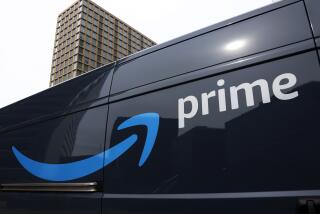Could Microsoft Grow Even Stronger, Larger?
- Share via
With federal appellate judges expressing dismay and skepticism about a court order to break up Microsoft Corp., some experts are suggesting that the company could emerge from its legal travails stronger than ever.
Microsoft not only seems likely to escape the most draconian penalties imposed by U.S. District Judge Thomas Penfield Jackson last year, but also is almost certain to face less aggressive antitrust enforcement during the Bush administration.
The company also is sitting on a cash hoard of about $23 billion, the harvest of its potent monopoly on personal computer operating systems and office software. Although Microsoft has greater cash needs than many of its rivals, this might give the firm a competitive advantage at a time when much of the technology sector is reeling from sharply slowing revenue.
“Microsoft is already stronger now in every market than it was at the beginning of this trial,” said Ed Black, president of the Computer and Communications Industry Assn., a Washington trade group. “It has 93% of the desktop market, 96% of office productivity products and 80% of the Web browser. Now they are going after servers [the high-capacity computers that serve businesses and help run the Internet]. Do we really want to have one company controlling all of this?”
That’s the critic’s point of view. The company’s supporters, however, believe that the impending end of the antitrust case is “a positive for customers,” in the words of Christopher Mortenson, an analyst at Deutsche Bank Securities. “A breakup of the company would be a long and painful process. Now they’ll be free to deliver integrated services over the Net.”
At the same time, competitors have been working hard to entrench themselves in many of the new markets in which Microsoft must compete to continue its phenomenal growth.
These include the hand-held computer market, in which Windows-based pocket PCs have made scant headway against devices relying on the competing Palm operating system; interactive television, in which it has failed to deliver a much-promised system allowing home viewers to entertain themselves via a digital set-top box; and the video game market, in which it is anticipating the launch of its Xbox game console this fall.
On its home turf, the personal computer, Microsoft is poised to roll out the latest iteration of its standard-setting operating system. Called Windows XP (for “experience”), the program has been touted as the biggest breakthrough for the consumer PC since Windows 95--a product that had the first customers lining up to purchase it and inspired a worldwide wave of PC buying.
Windows XP has been designed almost as a rebuke to critics and legal opponents. They groused about Microsoft’s habit of incorporating ever more features into Windows, subverting independent companies that sold products with the same features. The new Windows, to be introduced late this year, will feature an improved player for digital music and video files, a “firewall” to protect home Internet users from network intruders, and improved home networking capabilities. All are already offered by competing companies as stand-alone programs.
It is by no means certain how much of Judge Jackson’s opinion will be overturned by the U.S. Court of Appeals or whether it will fashion its own remedies to supplant his order to break Microsoft in two.
The appellate judges expressed doubts about one of Jackson’s major findings: that Microsoft attempted to monopolize the market for Web browsers by undermining competing software from Netscape Communications. They seemed more receptive to the argument that Microsoft had acted to maintain its monopoly of PC operating systems by moving aggressively against IBM, Sun Microsystems, Compaq Computer and other competitors.
“That’s the key to the case,” said Steven D. Houck, a New York attorney who served as the trial court advocate for the 19 states that joined the federal government’s lawsuit. “Their conduct on that count was much more egregious.” But Houck said the appellate court is unlikely to uphold the breakup order “on the record before them.”
Michael Gartenberg, a Microsoft expert at Hudson Venture Partners in New York, added: “No one’s out of the woods yet, but it’s clear from the [judges’] tone that there’s a good chance Microsoft will walk away from this.”
The stock market increasingly seems to believe it: While most tech shares have plunged this year, Microsoft stock is up 36% to $59.
Some observers say that watering down the sanctions sought by the Justice Department could free Microsoft to expand its hold on personal computer software to include the server market and others.
“If Microsoft wins a total victory or gets a wimpy settlement with the government, that will be a disaster,” said Robert Lande, a University of Baltimore law professor who has closely followed the antitrust trial. “It will definitely strike fear into rivals . . . [and] stifle innovation.”
The company has already signaled its intent to maintain its historical supremacy over the core software running on the personal computer. Every copy of Windows XP, for example, is expected to carry a unique code tied to the first computer on which it is installed, preventing users from illicit copying. Microsoft also hopes to sell more of its software via a subscription that must be renewed periodically, rather than purchased off the store shelf. If a user stopped subscribing, Windows or Microsoft Office would stop operating--ensuring the company of a continuing revenue stream.
“We think people will see it as an easy and unobtrusive process,” said Allen Nieman, Microsoft’s product manager for licensing technology.
Others believe that maintaining its position will not be so easy.
“Microsoft is unlikely to ever repeat the success of the combination of Windows and Office [the suite of programs that included its market- leading word processor and spreadsheet software], because that success came from inept competition,” Gartenberg said. “Now competitors have learned the lessons of history.”
Also, the company’s performance in new markets has been less than overpowering. Perhaps the best example is the battle for the television set-top box. In 1999, Microsoft appeared poised to dominate the market for cable box software on the strength of its $5-billion investment in AT&T;, one of the largest cable system operators, and billions in investments in other cable companies.
But the company has stumbled badly. It has yet to produce a serviceable interactive system, even though competitors such as Liberate Technologies already have systems installed around the country.
Similarly, customer acceptance of Windows-based hand-held devices has been slow, in part because the size and complexity of even a stripped-down Windows system make the devices cumbersome. Devices using the much simpler Palm system, including units made by Palm Computing and Handspring, still hold about 80% of the market.
Few believe that the company will be driven away from either of these markets, in part because retiring from a fight is not Microsoft’s style. It is more likely to return with improved offerings and to remain an important--if not dominant--player in both sectors. That’s important because analysts say the company is still too reliant on the desktop computer market.
“Clearly 70% of its revenues still come from PC software,” Mortenson said. “There’s a lot they have to do with the rest to continue to grow by 15% a year.”
Mortenson believes Microsoft’s most promising initiative is its “.Net” strategy, which involves integrating users’ manifold electronic devices so they work together seamlessly. “No one is integrating my PC with my wireless phone and my set-top box,” he said. “Sun and Oracle are talking about it, but Microsoft will be a player.”






